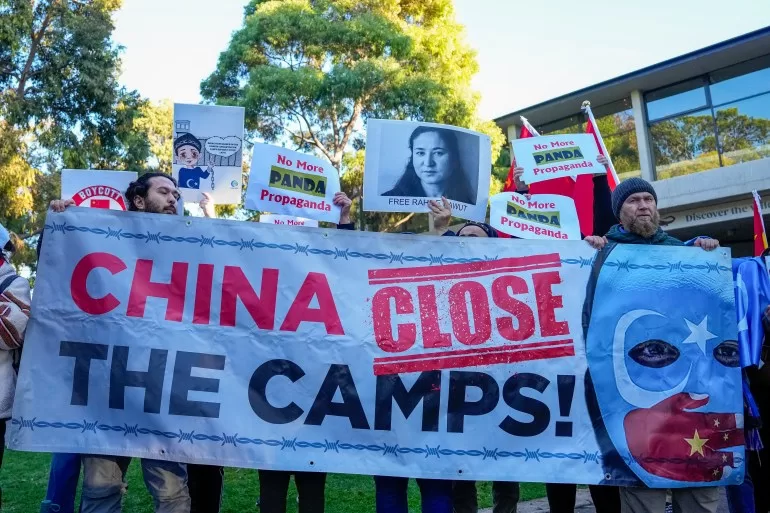Premier Li Qiang is the most senior Chinese leader to visit Australia since 2017.
Li’s four-day visit, the first by a Chinese premier in seven years, comes after Beijing removed sweeping tariffs on major Australian exports, including wine, coal and barley.
Before the meeting Albanese’s office said the prime minister would stress the importance of “ongoing dialogue” and “consistent, steady engagement”.
But he would also acknowledge the two countries’ differences.
“We won’t always agree – and the points on which we disagree won’t simply disappear if we leave them in silence,” Albanese was expected to say in an apparent reference to comments from Li on Sunday when he suggested “shelving differences” in the interests of improving relations.
Human rights protesters gathered outside the parliament building ahead of Li’s arrival, chanting slogans and waving flags and placards in support of Tibet, Xinjiang and Hong Kong.
There was a heavy police presence and a barricade had been erected to separate them from a group of pro-China waving the country’s flag.
A brass band played as Li inspected a military guard of honour on the forecourt of Parliament House, the 19-gun artillery salute only briefly drowning out the noisy crowds.
Lim, who arrived on Sunday, has used the trip to highlight trade, friendship and China’s love for Australian products.
But Albanese has pledged to broach trickier points of geopolitical tension and “national interest” at their closed door meeting including the plight of jailed dissident writer Yang Hengjun.
The China-born Australian writer was given a suspended death sentence in February after being found guilty of spying. The sentence was upheld by a Beijing court ahead of Li’s visit, Yang’s supporters said on Sunday.
They urged Albanese to ask Li to allow Yang’s transfer to Australia on medical grounds, saying in a statement it was “not possible to achieve a stable, respectful bilateral relationship with China while their officials are threatening to execute an Australian political prisoner”.

Australia has also criticised China’s military in recent months for its “unacceptable” and “unsafe” behaviour in international skies and waters, and has called for restraint in the disputed South China Sea, which Beijing claims almost in its entirety.
Australia has also joined the Quad security grouping with India, Japan and the United States, as well as the AUKUS pact with the United Kingdom and the US.
Foreign Minister Penny Wong said in a radio interview on Monday that such partnerships were to “ensure we have a safer and more stable region” but stressed that the need for continued engagement with China, which has framed the pacts as an attempt to contain it.
University of Sydney researcher Minglu Chen said Australia would be careful to smooth over public criticisms of its largest trading partner.
“I don’t know if all the problems on the security side will just disappear overnight,” she told the AFP news agency. “But I think this visit still has a symbolic meaning. Which is sending a good gesture, and for China to show the outside world it is still willing to embrace foreign countries.”
On his arrival on Sunday, Li said the relationship was “back on track” as he enjoyed lunch at an historic vineyard in South Australia that had been badly affected by the trade embargo.
He also announced two new pandas would be sent to Adelaide Zoo to replace a pair that are due to return to China by the end of the year.
China buys a third of Australia’s exports and supplies a quarter of Australia’s imports.
Trade between Australia and China reached 327 billion Australian dollars ($215.95bn) last year as Beijing’s trade blocks eased.
Relations deteriorated over Australian legislation that banned covert foreign interference in Australian politics, the exclusion of Chinese-owned telecommunications giant Huawei from Australia’s national 5G network due to security concerns, and Australia’s call for an independent investigation into the causes of and responses to the COVID-19 pandemic.
